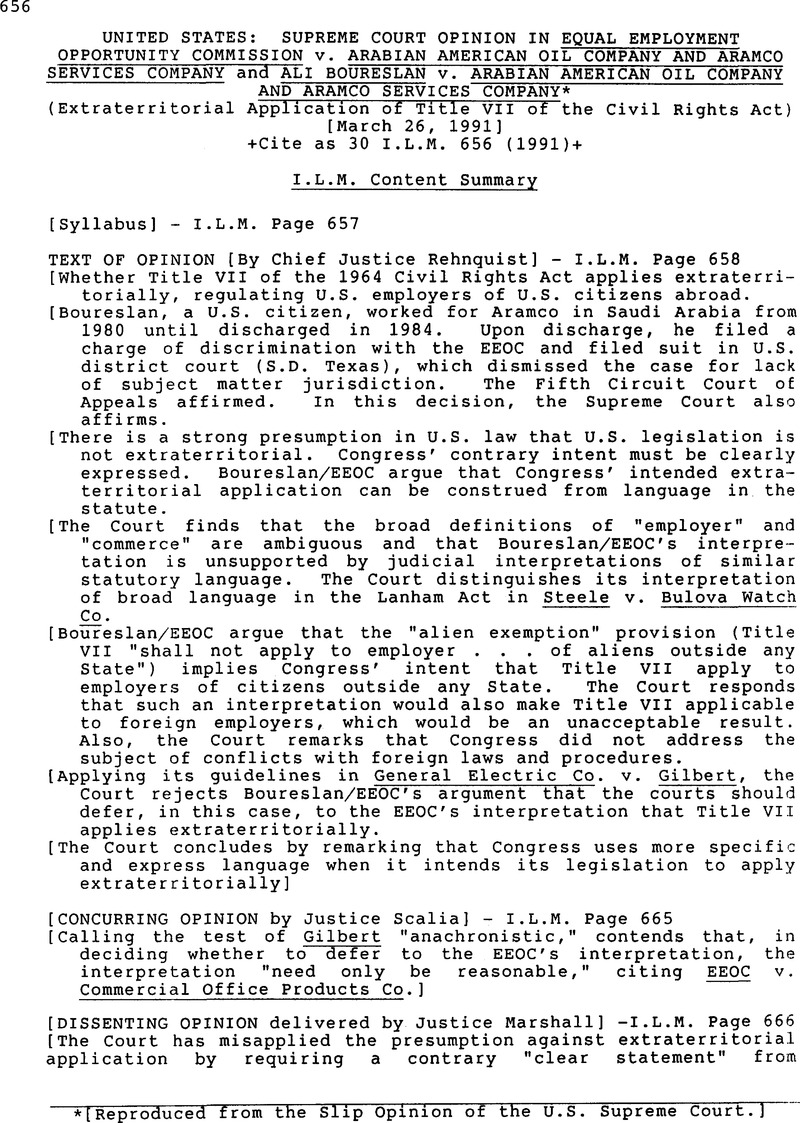No CrossRef data available.
Article contents
United States: Supreme Court Opinion in Equal Employment Opportunity Commission v. Arabian American Oil Company and Aramco Services Company and Ali Boureslan v. Arabian American Oil Company and Aramco Services Company (Extraterritorial Application of Title VII of the Civil Rights Act)
Published online by Cambridge University Press: 27 February 2017
Abstract

- Type
- Judicial and Similar Proceedings
- Information
- Copyright
- Copyright © American Society of International Law 1991
References
* [Reproduced from the Slip Opinion of the U.S. Supreme Court.]
* Title VII defines “employee” as: “an individual employed by an employer, except that the term “employee” shall not include any person elected to public office in any State or political subdivision of any State by the qualified voters thereof, or any person chosen by such officer to be on such officer's personal staff, or an appointee on the policy making level or an immediate adviser with respect to the exercise of the constitutional or legal powers of the office. The exemption set forth in the preceding sentence shall not include employees subject to the civil service laws of a State government, government agency or political subdivision.“42 U.S.C.§2000e(f)
1 The majority quotes this language, see ante, at 3, but then proceeds to disregard it completely in the course of its analysis.
2 It is also worth noting that although we have construed McCulloch and Benz as embodying a clear-statement rule, see NLRB v. Catholic Bishop of Chicago, 440 U.S490,500 (1979), the Court in both Benz, see 353 U.S.,at 142-146, and McCulloch, see 372 U.S.,at 19, consulted the legislative history of the statutes at issue in those cases before concluding that neither applied to the facts before the Court.
3 For purposes of Title VII, “[t]he term ‘State’ includes a State of the United States, the District of Columbia, Puerto Rico, the Virgin Islands, American Samoa, Guam, Wake Island, the Canal Zone, and Outer Continental Shelf lands defined in the Outer Continental Shelf Lands Act [43 U.S.C. 1331 et seq ].” 42 U.S.C. §2000e(i).
4 The alien-exemption provision was originally part of H. R. 405, 88th Cong., 1st Sess.(1963), reprinted in Civil Rights Hearings, at 2330. This bill, along with others, was incorporated (with amendments immaterial to the alien-exemption provision) into H.R.7152, the bill that became the Civil Rights Act of 1964. See H.R.Rep.No. 914, 88th Cong. 1st Sess.,57(1963) (additional views of Rep. Meader). The Committee Report accompanying H.R.405 was likewise incorporated into the record of committee hearings held on the various bills from which H. R. 7152 derived. See Civil Rights Hearings,at 2300.
5 The presumption was overcome in Vermilya-Brown because the legislation at issue in that case expressly applied to United States “possessions.” See 335 U.S., at 379,386; see also Foley Bros., 336 U.S.281,285 (1949).
6 In addition, a United States citizen who suffers employment discrimination abroad may bring a Title VII action against the United States employer in state court, see Yellow Freight System, Inc. v. Donnelly, 494 U.S(1990), to which the venue provisions of Title VII clearly would not apply, see Bainbridge v. Merchants & Miners Transp. Co., 287 U.S 278,280-281 (1932).
7 Congress’ amendment of the Adea to give it extraterritorial application does not reflect a congressional intent that Title VII be confined to domestic application. Congress amended the ADEA in response to lower-court decisions construing the ADEA to apply only domestically. These decisions distinguished the ADEA from Title VII in this respect, noting that the former did not contain a provision analogous to the alien-exemption provision. See Cleary v. United States Lines, Inc., 728 F. 2d 607,609 (CA3 1984); see also Pfeiffer v. Wm. Wrigley Jr. Co., 755 F. 2d 554,559(CA7 1985). Sponsors of the Adea amendment explained that it would make Adea and Title VII coextensive in their extraterritorial reach. See 129 Cong. Rec. 34499 (1983) (statement of Sen.Grassley).


